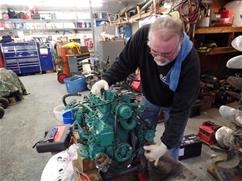
So you are considering a diesel motor, or maybe the boat you are looking at has one.
Here are some tips to remember, but it’s a good idea to have a certified diesel mechanic look at it
Testing Diesel Fuel
One of the most common headaches for new skippers of used boats is caused by microbes forming in diesel fuel that had been sitting for many months while the boat was for sale. Idleness encourages condensation, which is what microbes need for spawning. When a buyer is finally found, the engine may start during the survey and run OK for a while, but the first time the boat and the fuel tank get bounced around, the gunk gets stirred up, filters become clogged, and fuel is cut off to the engine. If you're buying a used boat, it is worthwhile to have a mechanic inspect the diesel itself and open the fuel tank inspection port, if there is one, or maybe take off the fuel sender to look for gunk in the fuel. Microbe levels can also be tested with a kit,
Starting and Running the Engine
Starting a diesel will often tell you as much about its condition as running a diesel. Diesels should fire up quickly, at least in warm weather. Diesels that continue cranking and cranking and cranking whenever they are started often have compression problems, although hard starting can also be caused by fuel system problems or using fuel with a low cetane rating.
Cooling System
Unless you operate your boat in a swimming pool (clean and well filtered), your diesel should have a sea strainer, preferably one with a clear bowl that is readily accessible. Inspect the strainer regularly and clean out any debris (close the seacock first). The impeller is another critical component in the cooling system that should be inspected periodically. Cracks at the base of impeller blades indicate that the impeller needs replacing. An impeller will usually last longer if you take it out over the winter to prevent its taking a set. Should the impeller fail, broken blades must be located or water flow to the engine could be blocked. It's also a good idea to keep a spare impeller aboard.
A marine diesel that looks like it’s in bad shape probably is in bad shape. Oil streaks, discolored paint (indicating excessive heat), frayed belts, and gunk in the bilge are a neglected engine's plea for help. Rule one, then, is spend some time cleaning your engine and getting to know where the various parts are located. Maybe keeping an engine clean and bright won't help it run better or last longer, but it's a start.
Fuel System
The key to a healthy diesel. "Clean fuel, clean fuel, clean fuel". The reason healthy fuel is so important has to do with its injectors, which are delicate instruments that spray fuel into the combustion chamber in a precise, ultra-fine mist. Even microscopic specks of dirt or water can eventually wreck injectors, the combustion process, the engine, and your account balance.